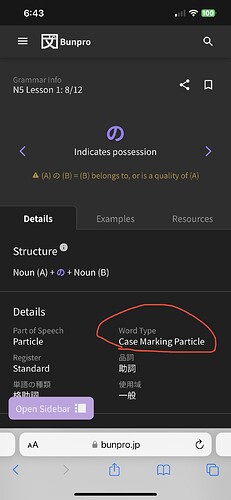Okay so I’ve used this service for almost a month and I’m really struggling with it so far. I’m not sure where my problem lies but when it comes to doing the reviews (and even the ‘reviews’ during the ‘learn’ phase) I absolutely suck. My miss rate for new stuff insanely high and the hints during review make 0 sense to me and I have no idea what they’re supposed to mean.
In the text box that you fill during reviews to test whether you remember the correct answer (or understand the grammar point necessary) I have no idea what some of the words mean.
From my own research on these words I have no idea what they mean in this specific context. Stuff like “Literary, Contrastive, Emphatic” just confuse me. I have no idea how to tie those keywords to a bit of grammar.
I also don’t know what it means when there’s some sort of ‘nuance’ to a grammar structure. On that topic I have very little knowledge, what even is a grammar structure?
What is a case marking particle? In the info section I don’t see anything that describes what it is. I might be missing something by not going through the additional resources.
If there are resources regarding this sort of thing please share them in the replies, I really want to understand how all this works and its driving me crazy. If the resources are already there under that specific grammar point let me know as well, I’ve been skipping them which could be the cause of my numerous mistakes.
Any general grammar resources and terms would also help.
These are just the questions I’ve noted down from my recent reviews where I constantly fail and cannot grasp the grammar points.

